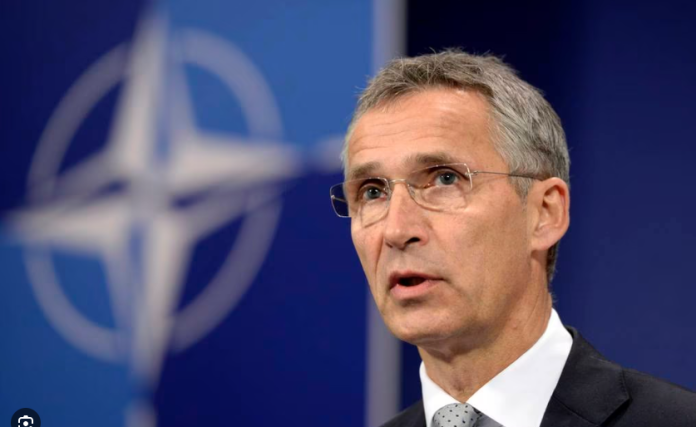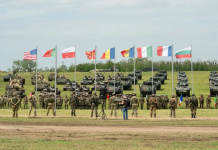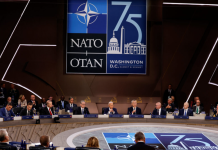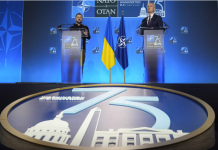By Alexandra Brzozowski and Aurélie Pugnet
Under NATO Secretary-General Jens Stoltenberg, the alliance’s top post has evolved from administrative facilitator to key powerbroker. As the race for his successor gains momentum, EURACTIV looks into the criteria behind the name game.
Stoltenberg, who has been at NATO’s helm since October 2014 and is expected to step down this autumn, has built a legacy as one of the faces of a coordinated Western response to Russian President Vladimir Putin’s war against Ukraine.
Although there have been no official successor talks yet, capitals have in recent weeks started reflecting on what qualities the next appointee should have, from experience and nationality to actual availability.
Informal selection process
According to NATO’s rules, its chief is nominated by member states for an initial period of four years, which can be extended by mutual consent.
In a rather informal procedure, NATO’s major military powers, the US and the so-called Quartet – France, Germany, United Kingdom, and Italy – first voice their preferences, and in later stages keep their hand in the nomination process by vetting any potential nominee.
The dean of NATO ambassadors, an honorary post for the longest-serving ambassador, currently held by Croat Mario Nobilo, then “invites” his counterparts for informal “internal, closed discussions” over those names.
These discussions focus on criteria and qualities NATO members would wish for in the candidate more than on actual personalities.
And, like with every top job, any potential candidate touted too early on risks being ‘burned’ and discarded.
Will he stay or will he go?
Stoltenberg had his mandate extended twice: First, in 2018 for another full four-year term, and the second time in March 2022, after Russia’s invasion of Ukraine, for one more year, which officially ends in October 2023.
EURACTIV understands that it remains unclear whether the position will pass on to a successor in the autumn, or whether Stoltenberg might stay on a bit longer.
Member states would not be opposed in principle to extending Stoltenberg’s mandate by another year should circumstances call for it, several NATO diplomats said, though they added it currently seems ‘unlikely’.
Speaking at a NATO foreign ministerial in Oslo, US State Secretary Antony Blinken gave a short speech that for many already sounded like a farewell to Stoltenberg, commending him for his “remarkable leadership of our alliance these past few years”.
Question of timing
If Stoltenberg’s mandate were indeed to be prolonged and the job becomes available only mid- or end-2024, this would align the job selection timeline with the EU’s very own “merry-go-round” top job discussions that will follow the EU elections due next June.
“Should we see a situation, where Stoltenberg stays on and the job is seen as part of the overall top job game between European capitals, it is likely to completely change the dynamics,” one EU diplomat told EURACTIV.
A second EU diplomat said it would be a precedent – “we’ve not been in such a situation yet” – adding that this “could have an impact on the negotiations, and member states bargaining power”.
With major national elections in Belgium, Romania, or Poland still to go, it could also mean more potential candidates might become available.
Spanish Prime Minister Pedro Sanchez, whose name is being dropped in Brussels as a strong contender for Stoltenberg’s post, also has a snap election this July.
Incumbent national leaders meanwhile might be reluctant to leave the national scene mid-mandate to take over the helm of the military alliance, NATO diplomats said.
“But if the president of the United States asks for you… can you really say no?” one of them quipped.
Another factor is the looming US presidential election in November 2024, which could see a potential return of Donald Trump, or a fellow NATO-sceptic Republican candidate, to the White House.
With decision-making relying on unanimity, the next NATO boss would be expected to manage and mediate differences inside the transatlantic alliance, a job Stoltenberg managed rather well, according to several NATO diplomats.
Dubbed by some in NATO corridors as the ‘Trump whisperer’, Stoltenberg has been credited for keeping alliance members together and the Trump administration’s wrath – over low European defence spending and reluctance to pivot to Asia – out of essential decisions.
According to several NATO diplomats, this would call for an experienced prime minister who would be on ‘equal footing’ with other heads of state and government, rather than someone who was previously only a cabinet minister.
With a landmark NATO summit in Washington next summer to celebrate the alliance’s 75th existence, there might be some considerations to give Stoltenberg a chance to shine after a decade in the job.
Criteria to be determined
Traditionally, the civilian post has been held by a senior European political figure, while the military post of the Supreme Allied Commander (SACEUR), in charge of commanding NATO troops, goes to a high-ranking US military official.
France has clearly stated it wants the post to go to someone from an EU country, cold-shouldering the potential candidacy of UK Defence Secretary Ben Wallace, whose name has been circulated.
Despite, or maybe even because of, the paradigm shift after Russia’s war on Ukraine, many Western European members are wary of considering a hawkish anti-Russia Eastern European for the job.
However, a non-Western European diplomat told EURACTIV that, “to play the devil’s advocate, an Eastern European in the position could prevent the alliance from underestimating future threats from Russia, which remain NATO’s security concern number one”.
Turkey or Greece are unlikely candidates as each would veto the other’s candidate over the long-standing Cyprus dispute.
Some NATO capitals believe the job should go to a candidate whose country fulfils the 2% GDP defence spending target.
Currently, this applies to only seven NATO members and would significantly reduce the list of candidates, but would include Denmark, whose Prime Minister Mette Fredriksen has been named a top contender for the job.
With no woman ever having held the post, a good part of NATO members have said they would support a female candidate over a male.
Source: euractiv.com/





